Gemini wrld
Welcome to gemini world, welcome to my world of infinite knowledge and possibilities.
- 491
- 0
- 31
Community
- Followers
- Following
523 items
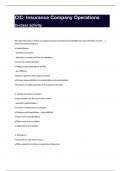
CIC- Insurance Company Operations In-class activity
CIC- Insurance Company Operations In-class activity Describe the ways in which a company may be structured and identify the characteristics of each - 1. Stock Insurance Company • Capitalization - owned by investors - objective to make profit for stockholders • Access to capital markets • Mergers and Acquisitions (M&A) - less difficult • Reach is greater with regard to brand • Primary responsibility is to stockholders not policyholders • Pressure on topline growth at...
- Exam (elaborations)
- • 30 pages •
CIC- Insurance Company Operations In-class activity Describe the ways in which a company may be structured and identify the characteristics of each - 1. Stock Insurance Company • Capitalization - owned by investors - objective to make profit for stockholders • Access to capital markets • Mergers and Acquisitions (M&A) - less difficult • Reach is greater with regard to brand • Primary responsibility is to stockholders not policyholders • Pressure on topline growth at...
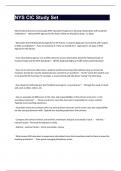
NYS CIC Study Set
NYS CIC Study Set What Federal document encourages EMS education Programs to develop relationships with Academic institutions? - National EMS Agenda for the future (what we should be doing - 15 Steps What does the EMS Educational Agenda for the Future: A systems Approach recommend with respect to EMS accreditation? - How we should do it. (How we should do it - approach to 15 steps in EMS Agenda for the future) From what federal agency can an EMS instructor access information abo...
- Package deal
- Exam (elaborations)
- • 101 pages •
NYS CIC Study Set What Federal document encourages EMS education Programs to develop relationships with Academic institutions? - National EMS Agenda for the future (what we should be doing - 15 Steps What does the EMS Educational Agenda for the Future: A systems Approach recommend with respect to EMS accreditation? - How we should do it. (How we should do it - approach to 15 steps in EMS Agenda for the future) From what federal agency can an EMS instructor access information abo...
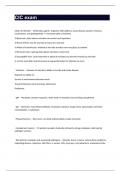
CIC exam
CIC exam Chain of Infection - 1)Infectious agent= organism with ability to cause disease; greater virulence, invasiveness, and pathogenicity => increased odds of infection 2) Reservoir: place where microbes can persist and reproduce 3) Portal of Exit: way for microbe to leave the reservoir 4) Mode of transmission: method of microbe transfer from one place to another 5) Portal of entry: opening that allows microbe to enter host 6) Susceptible host: Lacks immunity or physical resista...
- Package deal
- Exam (elaborations)
- • 35 pages •
CIC exam Chain of Infection - 1)Infectious agent= organism with ability to cause disease; greater virulence, invasiveness, and pathogenicity => increased odds of infection 2) Reservoir: place where microbes can persist and reproduce 3) Portal of Exit: way for microbe to leave the reservoir 4) Mode of transmission: method of microbe transfer from one place to another 5) Portal of entry: opening that allows microbe to enter host 6) Susceptible host: Lacks immunity or physical resista...
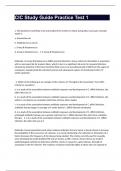
CIC Study Guide Practice Test 1
CIC Study Guide Practice Test 1 1. The bacterium most likely to be transmitted from mother to infant during labor and cause neonatal sepsis is: a. Escherichia coli b. Staphylococcus aureus c. Group B Streptococcus d. Group A Streptococcus - 1. C Group B Streptococcus Rationale: In Group B Streptococcus (GBS) neonatal infections, heavy maternal colonization is associated with an increased risk for preterm labor, which in turn is a significant risk actor for neonatal infection. Intrau...
- Package deal
- Exam (elaborations)
- • 64 pages •
CIC Study Guide Practice Test 1 1. The bacterium most likely to be transmitted from mother to infant during labor and cause neonatal sepsis is: a. Escherichia coli b. Staphylococcus aureus c. Group B Streptococcus d. Group A Streptococcus - 1. C Group B Streptococcus Rationale: In Group B Streptococcus (GBS) neonatal infections, heavy maternal colonization is associated with an increased risk for preterm labor, which in turn is a significant risk actor for neonatal infection. Intrau...
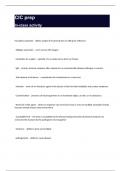
CIC prep In-class activity
CIC prep In-class activity Faculative anaerobe - utilizes oxygen if its present but can still grow without it Obligate anaerobes - can't survive with oxygen Incubation for scabies - typically 4 to 6 weeks but as short as 10 days IgM - primary immune response after exposure to a communicable disease pathogen or vaccine 2nd element of virulence - a mechanism for transmission to a new host Infection - entry of an infectious agent in the tissues of the host that...
- Package deal
- Summary
- • 35 pages •
CIC prep In-class activity Faculative anaerobe - utilizes oxygen if its present but can still grow without it Obligate anaerobes - can't survive with oxygen Incubation for scabies - typically 4 to 6 weeks but as short as 10 days IgM - primary immune response after exposure to a communicable disease pathogen or vaccine 2nd element of virulence - a mechanism for transmission to a new host Infection - entry of an infectious agent in the tissues of the host that...
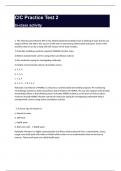
CIC Practice Test 2 In-class activity
CIC Practice Test 2 In-class activity 1. The infection preventionist (IP) on the Antimicrobial Stewardship Team is thinking of ways that he can support efforts and add to the success of the team in decreasing antimicrobial resistance. Some of the activities that he can do to help with the mission of the team include: 1) Calculate multidrug-resistant organism (MDRO) infection rates 2) Detect asymptomatic carriers using active surveillance cultures 3) Use molecular typing for investigatin...
- Package deal
- Exam (elaborations)
- • 62 pages •
CIC Practice Test 2 In-class activity 1. The infection preventionist (IP) on the Antimicrobial Stewardship Team is thinking of ways that he can support efforts and add to the success of the team in decreasing antimicrobial resistance. Some of the activities that he can do to help with the mission of the team include: 1) Calculate multidrug-resistant organism (MDRO) infection rates 2) Detect asymptomatic carriers using active surveillance cultures 3) Use molecular typing for investigatin...
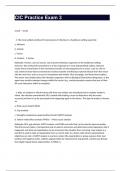
CIC Practice Exam 3
CIC Practice Exam 3 revisit - revisit 2. The most unlikely method of transmission of infection in a healthcare setting would be: a. Airborne b. Vehicle c. Vector d. Contact - C Vector Rationale: Vectors, such as insects, may transmit infectious organisms in the healthcare setting; however, this method of transmission is of less importance in most industrialized nations. External vector-borne transmission is the mechanical transfer of microorganisms by a vector, such as a fly on...
- Package deal
- Exam (elaborations)
- • 59 pages •
CIC Practice Exam 3 revisit - revisit 2. The most unlikely method of transmission of infection in a healthcare setting would be: a. Airborne b. Vehicle c. Vector d. Contact - C Vector Rationale: Vectors, such as insects, may transmit infectious organisms in the healthcare setting; however, this method of transmission is of less importance in most industrialized nations. External vector-borne transmission is the mechanical transfer of microorganisms by a vector, such as a fly on...
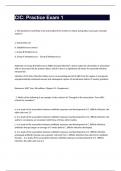
CIC: Practice Exam 1
CIC: Practice Exam 1 1. The bacterium most likely to be transmitted from mother to infant during labor and cause neonatal sepsis is: a. Escherichia coli b. Staphylococcus aureus c. Group B Streptococcus d. Group A Streptococcus - Group B Streptococcus Rationale: In Group B Streptococcus (GBS) neonatal infections, heavy maternal colonization is associated with an increased risk for preterm labor, which in turn is a significant risk factor for neonatal infection. Intrauterine infec...
- Package deal
- Exam (elaborations)
- • 83 pages •
CIC: Practice Exam 1 1. The bacterium most likely to be transmitted from mother to infant during labor and cause neonatal sepsis is: a. Escherichia coli b. Staphylococcus aureus c. Group B Streptococcus d. Group A Streptococcus - Group B Streptococcus Rationale: In Group B Streptococcus (GBS) neonatal infections, heavy maternal colonization is associated with an increased risk for preterm labor, which in turn is a significant risk factor for neonatal infection. Intrauterine infec...
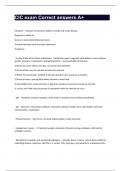
CIC exam
CIC exam Correct answers A+ Virulence - Measure of microbe's ability to invade and create disease Depends on ability to: Survive in environment between hosts Transmit between hosts (moving; adherence) Proliferate List the 6 links of the Chain of Infection - 1)Infectious agent= organism with ability to cause disease; greater virulence, invasiveness, and pathogenicity => increased odds of infection 2) Reservoir: place where microbes can persist and reproduce 3) Portal of Exit...
- Package deal
- Exam (elaborations)
- • 35 pages •
CIC exam Correct answers A+ Virulence - Measure of microbe's ability to invade and create disease Depends on ability to: Survive in environment between hosts Transmit between hosts (moving; adherence) Proliferate List the 6 links of the Chain of Infection - 1)Infectious agent= organism with ability to cause disease; greater virulence, invasiveness, and pathogenicity => increased odds of infection 2) Reservoir: place where microbes can persist and reproduce 3) Portal of Exit...
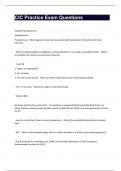
CIC Practice Exam Questions
CIC Practice Exam Questions Atypical Mycobacterium Staphylococcus Pseudomonas - What organisms have been associated with transmission of infection after body piercing? When an epidemiological investigation is being conducted. ( very costly no standards exists) - What is an indication for routine environmental culturing? 1. HA- TB 2. Single case aspergillosis 3. HA- Varicella 4. Increase in post op SSIs - What can HVAC malfunctions cause in the hospital setting? 41 F/ ...
- Package deal
- Exam (elaborations)
- • 34 pages •
CIC Practice Exam Questions Atypical Mycobacterium Staphylococcus Pseudomonas - What organisms have been associated with transmission of infection after body piercing? When an epidemiological investigation is being conducted. ( very costly no standards exists) - What is an indication for routine environmental culturing? 1. HA- TB 2. Single case aspergillosis 3. HA- Varicella 4. Increase in post op SSIs - What can HVAC malfunctions cause in the hospital setting? 41 F/ ...
